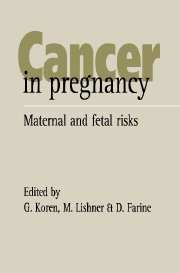Book contents
- Frontmatter
- Contents
- Preface
- List of contributors
- Part I Introduction
- Part II Specific tumors during pregnancy
- 8 Maternal and fetal outcome following breast cancer in pregnancy
- 9 Maternal and fetal outcome following Hodgkin's disease in pregnancy
- 10 Non-Hodgkin's lymphoma and pregnancy
- 11 Maternal and fetal outcome following invasive cervical cancer in pregnancy
- 12 Pregnancy and ovarian cancer
- 13 Malignant melanoma and pregnancy
- 14 Leukemia during pregnancy
- 15 Thyroid cancer and pregnancy
- Part III Fetal effects of cancer and its treatment
- Index
8 - Maternal and fetal outcome following breast cancer in pregnancy
from Part II - Specific tumors during pregnancy
Published online by Cambridge University Press: 06 July 2010
- Frontmatter
- Contents
- Preface
- List of contributors
- Part I Introduction
- Part II Specific tumors during pregnancy
- 8 Maternal and fetal outcome following breast cancer in pregnancy
- 9 Maternal and fetal outcome following Hodgkin's disease in pregnancy
- 10 Non-Hodgkin's lymphoma and pregnancy
- 11 Maternal and fetal outcome following invasive cervical cancer in pregnancy
- 12 Pregnancy and ovarian cancer
- 13 Malignant melanoma and pregnancy
- 14 Leukemia during pregnancy
- 15 Thyroid cancer and pregnancy
- Part III Fetal effects of cancer and its treatment
- Index
Summary
Cancer occurring during pregnancy poses a very difficult challenge to the woman, her family and her physicians, because therapy of her cancer may be detrimental to the unborn baby. Equally difficult, postponement of her therapy may theoretically decrease her chances of survival. Traditionally, cancer during pregnancy was believed to be associated with poor prognosis and an increased risk of harm to the fetus. This impression may have led to unnecessary fear on the part of the patient and her physician; conversely, some recent studies have indicated that the pessimistic view is not based on objective data.
Breast cancer is the most common tumor in women of reproductive age; 3% of breast cancer occurs in pregnancy. Because of the relative rareness of breast cancer in pregnancy, there is paucity of information on the effects of pregnancy on the course of breast cancer, and the effect of the disease and its therapy on pregnancy outcome.
Using a large database accumulated for over 30 years in an oncologic hospital in Toronto, we undertook an historical cohort study to assess the effects of pregnancy on the diagnosis and course of breast cancer and the impact of the disease and its treatment on fetal outcome.
Methods
To study the potential effects of pregnancy on women's survival, we matched women having breast cancer in pregnancy to nonpregnant women with the tumor.
- Type
- Chapter
- Information
- Cancer in PregnancyMaternal and Fetal Risks, pp. 95 - 106Publisher: Cambridge University PressPrint publication year: 1996
- 3
- Cited by



